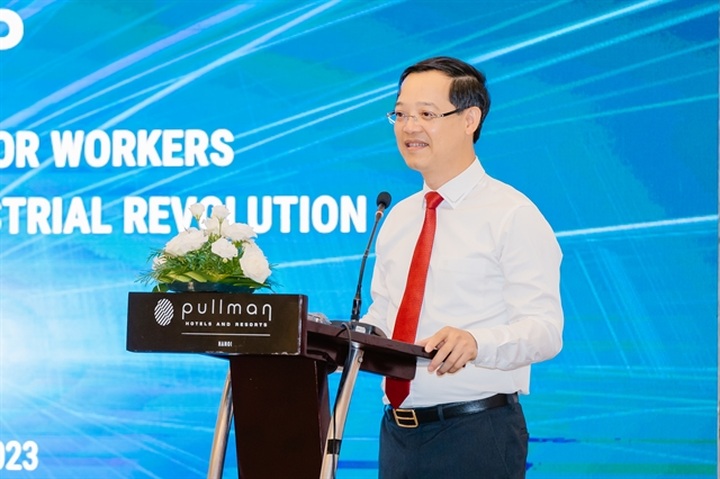
They are parts of the results of the project “Supporting the Government of Vietnam in the Digital Transformation of Labour through Enhancing Technical and Vocational Education and Training”, which was declared on Friday in Hanoi.
The project, implemented in partnership between the International Organisation for Migration (IOM) and the Directorate of Vocational Education and Training (DVET), with support from the Vietnam General Confederation of Labour, started in 2021 in four provinces, including Thái Nguyên, Quảng Nam, Bình Dương and Đồng Nai.
After more than two years, 31,100 courses have been completed and nearly 26,000 certificates have been issued for digital skills courses, contributing to improving the skills of workers, especially migrant workers in industrial zones.
These results have confirmed the potential of the online learning platform in building capacity and connecting technical and vocational education and training (TVET) institutions with businesses to equip learners with digital skills to access knowledge and information.
It promotes digital transformation in TVET, moving towards building a digital society, digital economy and digital culture and towards safe and sustainable migration.
In addition, the reference manual for digital transformation in TVET has been elaborately and scientifically compiled to provide the most basic knowledge about digital transformation, which is the basis for vocational education institutions to build a digital transformation plan in the near future.
Trương Anh Dũng, director of the DVET, said that the Fourth Industrial Revolution had had a strong impact on the world, forcing governments and countries around the world to face great challenges, requiring changes to match technology and science development.
Digital transformation is an inevitable trend to transform operation and business models towards innovation, thereby improving the country's competitiveness.
“Vietnam is considered one of the first countries in the world to issue a national digital transformation programme and has an awareness of digital transformation in parallel with advanced countries in the world, but the reality shows that the digital capabilities of the Vietnamese workforce are still weak and not ready for the Revolution 4.0,” he said.
Therefore, the Vietnam Government strives to promote digital skills transformation in all areas, including TVET, in order to utilise digital skills to improve people's working ability and productivity of the working-age population, especially vulnerable groups.
“With the positive feedback and participation of learners, in the coming time, we will coordinate with the IOM and partners to popularise the congdanso.edu.vn online learning platform and the reference manual for digital transformation in TVET to vocational education institutions,” said Dũng.
IOM Chief of Mission Park Mihyung said: “Investing in skills development in Vietnam is very important. It helps people get better jobs and work more productively, which makes the country stronger in the world economy. That’s why IOM takes pride in our work, especially our e-learning platform."
"It improves access for low-skilled workers and migrant workers to gain essential skills, such as technical, soft, and digital skills. This reduces their vulnerability, helps them navigate in the digital environment, making them more adaptable and resilient.
“Together, we are supporting Vietnam’s goal of elevating its vocational education to gradually match top regional countries by 2030, with a vision to 2045,” she said.




















